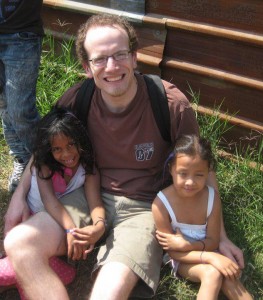We are not persecuted; we are privileged. Even so, Jesus calls us to a radical love for our enemies in Matthew 5:38-48. Listen to Pastor David’s message about how we can and should go about that kind of love.
Eulogy for James
My friend James died this past Sunday at 10:45am. He died of a rare and aggressive form of leukemia that whittled away at his strength for the past couple of years. James did not want a funeral or memorial service. He will be cremated, and the world will move on.
Most people would not care to know James. Let me introduce him to you. James was an ex-con, incarcerated on three separate occasions: once for statutory rape, once for breaking and entering, and once for check fraud. His last conviction was his “third strike,” and he spent twelve years in prison as a result. Continue reading
Fruit of the Spirit: Love
In this new series, Pastor David helps us explore the intersection of the fruit of the Spirit with Old Testament stories. The dramatic story of David and Jonathan illustrates the first fruit of the Spirit: love. Check out 1 Samuel 20, and listen to this week’s sermon:
We Never Walk Alone
Do you ever feel like God is distant or unaware of your situation? What does scripture have to say about our walk through life with the Lord? Read John 14:15-21, and then listen in to Pastor David’s sermon on this passage.
Commissioning Our Guatemala Team
On Sunday, February 2, Pastor Jerry preached on Philippians 2 and spoke about our church’s upcoming mission trip to Guatemala, the recent death of his father, and our call to Christian living in our everyday lives. Listen in to this powerful message! And remember to pray for our Guatemala Team, which leaves this Thursday (February 6) and returns next Thursday (February 13)!
Pursuing Peace
Jesus said some challenging words in the Sermon on the Mount, found in our New Testament in Matthew chapters 5, 6, and 7. Today I’d like you to take a few moments to find and read Matthew 5:38-48. Do that, if you would, before reading the rest of this article.
There is something counter-cultural about the way Jesus calls us to live. In the first-century world, the relatively young Roman Empire controlled Palestine, the area in which Jesus lived and ministered. Jews such as Jesus could have been forced to assist Roman soldiers in carrying supplies and materials for certain distances. Walking “the second mile” thus became something counter-cultural, almost revolutionary: it broke down the difference in power between a Jew and a Roman.
In the first-century world, if someone slapped you (with his right hand) on your right cheek, this was a power-building maneuver: the aggressor states his dominance over you with this action. Turning the other cheek (to receive another slap), as Jesus instructs, leaves the aggressor with an uncomfortable choice. Either he must use his left hand, which was considered unclean, or he must use his right hand again – but this time using the front of his hand, not the back of his hand, to strike your left cheek. Slapping with the front of the hand was understood as a challenge between equals; you might expect the aggressor to say “I challenge you to a duel!” at this point. Again, this is counter-cultural, almost revolutionary: Jesus tears down expectations of power-based relationships between people.
One year ago, a teenage girl stood up for the right of girls like her to receive an education. As a result, in October 2012 she was targeted by aggressors who wished to silence her message by eliminating the messenger. She and several others were shot, many of them killed, but she survived the gunshot wounds to her face. This girl spent the next year recovering and continuing to speak out against the injustices in her world. She became so well-known and beloved for her positions supporting justice and peace that she was nominated for the Nobel Peace Prize this year. Her name? Malala Yousafzai, a sixteen-year-old Pakistani girl.

In a recent television interview, Malala said something truly astounding. When asked what went through her mind when she realized the Taliban (her eventual attackers) wanted her dead, she said:
I started thinking about that, and I used to think that the Talib would come, and he would just kill me. But then I said, ‘If he comes, what would you do Malala?’ then I would reply to myself, ‘Malala, just take a shoe and hit him.’ But then I said, ‘If you hit a Talib with your shoe, then there would be no difference between you and the Talib. You must not treat others with cruelty and that much harshly, you must fight others but through peace and through dialogue and through education.’ Then I said I will tell him how important education is and that ‘I even want education for your children as well.’ And I will tell him, ‘That’s what I want to tell you, now do what you want.’
Malala Yousafzai is a practicing Muslim. Jesus is seen as a prophet within Islam, and in many ways I see Malala’s words above echoing Jesus’s thoughts from the Sermon on the Mount. What she said is counter-cultural, both in Pakistan and in the western world. Her stance toward her aggressors breaks down power dynamics and asserts the ultimate value that each person in the world has in God’s eyes.
What if we were to pursue peace as strongly in our own lives? What if we loved and prayed for our enemies? What if this is what it means to be “perfect” or “complete” or “mature,” as Jesus commanded us to be, in imitation of our heavenly Father?
Pastor David
Good News
By now, you probably have heard the story of Antoinette Tuff, the Georgia school bookkeeper who this week helped to prevent a tragic school shooting by talking with the 20-year-old man who entered the school armed with an AK-47. Many people are talking about, writing about, and celebrating the heroic actions and bravery of this woman. Ms. Tuff kept the potential shooter talking while he decided what to do: whether to attack students and staff, injure himself, or surrender to the police. For half an hour, she kept calm and spoke wisdom to this young man until, ultimately, he laid down his gun without having injured or killed a single person.

This is a tremendous story of love and compassion in action. I want to highlight a few principles for us to consider:
- This threat was met with the love of Christ. As I listened to the recording of Ms. Tuff’s 911 call, I was amazed by how she spoke kindly to him, treated him with compassion, and even told him that she loved him. She spoke openly of pain in her past that led her to consider suicide, but she reassured him that this was not the best answer. She told him that she was proud of him for giving up without hurting anyone. The love of Christ is powerful, because even in tense and dangerous situations, this love empowers us to treat other people as human beings with real needs. “So in everything, do to others as you would have them do to you, for this sums up the Law and the Prophets” (Matthew 7:12 NIV).
- This threat was met with nonviolence. This story should be a powerful reminder to us that dangerous situations can be handled appropriately with nonviolence. Historically, the Church of God is a peace-loving organization. We believe that the way of Jesus is one of peace, not violence; hope, not fear; love, not anger. Jesus instructed a disciple to sheathe his sword when the Lord was arrested (Matthew 26:50-52). Jesus himself, while being beaten and ridiculed, did not fight back against his assailants (Luke 22:63-66). Even when the end result was his own death, Jesus was never violent – and his disciples carried on that tradition at his instruction.
- This threat was met with preparation. School employees undergo regular training on what to do in exactly this scenario. Ms. Tuff gave witness to that after the fact; the training helped her handle the situation with her instincts. Put differently, the training formed her into the kind of person that could appropriately handle this potential shooting. Jesus was tempted by the devil before beginning his ministry (Matthew 4:1-11). Jesus invested heavily in his disciples so they would know how to behave after his death, resurrection, and ascension. Later, Paul instructed young Timothy to persist in his spiritual practices so that his life would be transformed, along with the lives of those around him (1 Timothy 4:12-16).
What would our lives look like if we were to live by the love of Christ, an attitude of nonviolence, and daily spiritual preparation? How would we – and our culture – be transformed?
–Pastor David
Reflections on Guatemala
I sit here on a snowy Thursday morning and find myself reflecting on how, just one week ago, several of us from Mt. Haley were experiencing different weather, a different language, a different culture, and a different sense of community.
We as a church have been building up for this Guatemala “Shack Attack” trip for quite some time. We gave over $2,500 toward expenses for the trip and, more importantly, for a house to be built for a family in Guatemala City. We joined hands with a neighboring church, Meridian Church of God, to bring about this experience, in which we shared the love of Christ with hundreds of children and adults and in which we learned a great deal about ourselves and our own way of life. I’d like to share with you a few of the lessons I learned on this trip.
- Though cultures differ greatly, family is universally important. The house we worked on will soon be home to a family of five, and yet it is very small – certainly smaller than our youth room at church. This family will make this newly constructed space their home, and that is quite significant. We also visited the home of a family whose house was built this time last year – a truly beautiful space that has quickly become their home in the past few months. Having a space for families to live life, to build relationships, to grow together – this is a crucial component of life both in the Guatemalan community we visited and for us here in the States. What is your family life like? What space have you created for those relationships?
- Though languages differ greatly, Christian love is universally understood. We saw this lesson most clearly when we attended a Sunday morning worship service in the church just a hundred yards down the railroad tracks from the house construction location. We witnessed laughter, greetings, and hugs among the Christian community there. We participated in tremendous worship of our Lord with familiar and unfamiliar songs sung in Spanish. We experienced a remarkable display of Christian humility through a public confession of sin, and we saw the body of Christ extend forgiveness to those who made that confession. Where do you see Christian love expressed in your life? How would your life change if you saw it more clearly?
- Though personalities differ greatly, relationships are universally meaningful.

Andrea and Julia Many of the children we met in Guatemala were gregarious, excited to see us, talkative, and very expressive. Some, however, were much more quiet and reserved – like me! While I watched the dozens of children we saw each day, I noticed that some children, just like here at home, tended to be in the center of attention, while others stayed on the edges of the group. And then, on our last day at “the tracks,” two young girls appeared at my side: Andrea and Julia. These two girls, eight and seven years old, respectively, were very shy and not very talkative. But they plopped themselves down next to me and were content just to be next to me or to be held on my lap for the bulk of the day. Who are the “overlooked” people in your daily life? Are you one of them? How can God use your personality to be a blessing to people around you?
Whether in the sunshine or in the snow, whether in 70 degree weather or 20 degree weather, God is at work in people’s lives. I am excited to continue bringing about the kingdom of God in our own community after seeing it at work in Guatemala City last week! Will you join me in our ongoing mission work?
–Pastor David
The Time is Near
I am writing this just after the conclusion of the National Conventions of America’s two major political parties. Much of our primetime television in the past two weeks has focused on these two conventions, the speakers, speeches, fact-checking efforts, and political reactions. Now more than ever, our nation is focused on one election (although many will occur in November): Who will be our next President?

Both campaigns have shown, and will continue to show, just how negative their advertisements can be with respect to each other. I don’t believe it’s pessimistic at all to suggest that the next several weeks might be full of attack ads and fiercely negative communication from both sides.
In your devotional time, take a few moments to read Romans 13. In this short chapter, Paul encourages Christians to submit to the governing authorities. Remember that these people were living in Rome, the center of the Roman Empire and primary location of persecution of Christians in the early years of our movement. For Christians to submit to the Roman emperor must have been very difficult indeed, especially when some of those emperors (such as Nero, Domitian, and Tragan) executed Christians regularly.
This chapter agrees with Jesus’s teachings in Matthew 22:34-40 that fulfilling God’s law is summarized by the requirement to “love your neighbor as yourself.” Paul encourages this way of living through “understanding the present time”: the time of salvation was drawing close for Paul and the early Christians. This may suggest a belief in the second coming of Jesus Christ, which is always drawing closer, or it may reflect the potential for early Christians’ lives to end quickly due to Roman persecution. In either case, understanding the present time was crucial for the church’s success in dealing with the hardships they were facing.
Friends, as we approach this presidential election, let us remember to pray for our elected leaders. Let us give thanks that we do not face violent persecution for our faith, nor do we experience violent transitions of power like many other people groups throughout history. Let us submit to our governing authorities, pay taxes, give respect and honor where it is due, and love our neighbors as ourselves. No matter what the result of the election – whether you are pleased or displeased, frightened or calmed by it – remember that “our salvation is nearer now than when we first believed.” Clothe yourself with the Lord Jesus Christ!
–Pastor David
As long as we love him…

Recently, four of our congregation’s children completed their study on baptism. These were the four who were baptized on Easter Sunday. What a day of rejoicing that was! In preparation for their baptisms, each student completed a study book on baptism in which they answered questions about Bible stories and passages relating to baptism.
One of the questions asked the children to read Romans 8:28 and write what it says in their own words. Here is Romans 8:28 (NIV):
And we know that in all things God works for the good of those who love him, who have been called according to his purpose.
And here is one student’s summary of that verse:
As long as we love him, he will call us.
Take a minute to think about that statement! As long as we love him, he will call us. While that thought might not be exactly what Paul intended when he wrote those words, I think it’s a beautiful way of describing the relationship between our love for God and his call on our lives. I have never thought of this relationship in quite this way, but it really interests me. It might even help us adults answer some important questions that we face:
How can you tell if God has called you? Well, if you love him, then he has called you according to his purpose. It’s as easy as that!
What has God called you to do (or be)? That’s a tricky question that each of us answers differently based on our talents, skills, interests, and situation in life. But anything God has called us to do (or be) will be rooted in our relationship of love with him. That’s the starting point.
Has God’s call on your life run out? Have you completed your tasks? Is it time to retire from the service? No! Remember, as long as we love him, he will call us.
God is always up to something new. Sometimes God is making our lives new; at other times, it might be our families or our church or our community that he is calling to become new. But we can rest assured that for as long as we love the Lord, he will indeed call us according to his purpose. And we may be comforted to know the truth of the rest of Romans 8:28 – that in order for his purpose to succeed in our lives, God works all things for our good. (The emphasis is on God’s purpose being fulfilled in us, not in our experience of all things working out.)
Friends, be encouraged by this child-like restatement of a scriptural truth. Love God, listen for his call, and ready yourself for new avenues of service in his kingdom!
–Pastor David